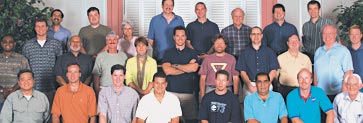By Dr. Owen Gadeken
The scene was all too familiar to me: a new leader with a new project. Gone were my days as a manager on Air Force missile development projects. I had just joined the faculty at Defense Systems Management College to teach project management. Now we had a new commandant, an Air Force Brigadier General who was out to revolutionize our capstone project management course.
In due fashion, he assembled his project team faculty and staff and announced he had a “new vision” for project management training in the Department of Defense. We would create a new course with a single evolving project as a central theme. We would cover the entire project life cycle using a series of case studies based on this single project. Further, we would construct the new course as a “living project” so that student decisions could be incorporated to change the scenario as it evolved. This ability to adjust the case “on the fly” would allow students to actually see the impact of their early decisions on project outcomes.
As he went on, I remember saying to myself, “What an innovative concept, but it will never work in our system.” We had up to 300 students going through the course at a time. If each student group were allowed to adjust the scenario as they went along, we would have an enormous configuration management problem.
Also, the bulk of our cases studies came from real world projects where we had actual cost, schedule, and performance data. Where would we get the data to feed to each group as they departed from the baseline scenario? Our faculty prided themselves on meticulous preparation before teaching each case study. What type of faculty would it take to respond to this constantly changing scenario? A set of “negative fantasies” raced through my mind if we were to adopt the commandant’s new approach.
After concluding with a comment about how this would revolutionize our educational process, the commandant said he was interested in our candid feedback on his proposal. My instant reaction was, “Sure, he’s interested in feedback — as long as it supports his idea.” Having been through situations like this many times before, I resolved to keep my mouth shut and was certain my colleagues would do likewise. Even if the vision proved futile, which was highly likely in my opinion, we would just wait a couple years for the next commandant to rotate in with another vision.
So I anticipated the usual prolonged and uncomfortable silence followed by a politically correct question or two. But this was not to be as my colleague Don, who had convinced me to change jobs and come to the college, raised his hand and stood up to speak from the back of the room. “Sir, with all due respect, your vision won’t work. I admire the concept, but it is too complex for our students and faculty to execute.”
I knew Don was thinking this, but I couldn’t believe he was saying it publicly. I lapsed briefly into another negative fantasy. Perhaps the commandant would let Don stay on for a few months before he terminated his faculty appointment (all faculty were on excepted service term appointments). Or maybe he would just reassign him to one of our new regional “outposts.”
After giving Don time to outline the reasons to support his position, the commandant responded immediately. He surprised us all by praising Don for his courage in voicing an opinion counter to his vision. The general went on to say that he encouraged people to state their honest opinions even if they were not in agreement with his or other senior leadership positions.
Even after this statement by the commandant, many of us continued to expect negative fallout from Don’s challenge to the general’s vision. But it never came. Don kept his viewpoint, his job, and actually became the commandant’s favorite “lightening rod” for candid feedback on any new proposals.
And the commandant’s vision? It never came to be, either. We worked hard on it and had some success in our pilot offering. But, in the end, Don was right. It was too complex for both faculty and students to execute. So we gradually moved back to enhancing our current course offering.
Ironically, there were several positive repercussions from this experience. Don’s “free to speak your mind” example was not lost on the organization. Other faculty and staff gradually felt more empowered to speak up and offer their candid views about on-going projects.
Even though the commandant’s vision ultimately failed, we learned a great deal from the experience that was incorporated as improvements to our existing project management courses. We also kept the spirit of experimentation and allowance for failure alive and well at the college. We continued to try new approaches. Even if they didn’t succeed, we always learned valuable lessons from the process.
And the commandant? He gave the vision his “best shot” and after the normal two-year tour, retired, moved to Colorado, finished his doctorate, and embarked on a new career as an independent consultant.
As I think back on this incident, it stands out clearly as one of the “tipping points” in my career in project management training. While it seemed like an almost trivial event at the time, it reinforced the value of praising rather than “shooting the messenger.” I found myself using this same approach on teams I led with equally successful results.
Lessons
- Even the most trivial event can influence the climate and ultimately the results on a project.
- Being able to speak freely without repercussion is an important element in any team or project.
- Sometimes our negative fantasies keep us from making positive contributions to our team or project.
Question
In light of evidence that suggests cultural change is rarely accomplished strictly by executive fiat, what can we do to cultivate an environment in which speaking up is rewarded, not silenced?
Read more about project management training:
The Enterprise Project








